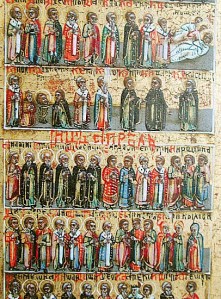 |
|
|
|||||||||||||||||||||||
|
|
About this site plusHow this web site is organized Most Patristic and Church scholars date the Early Church from A.D. 33 to A.D. 787, when St. John Damascene died. For that reason, this site has been organized into three time eras within the age of the Early Church. A fourth era has been added for what the Catholic Church teaches today. This way, both the avid reader and novice to the writings of the Early Church Fathers, will be able to see what the very first Christians thought and taught about Christianity, and the Church Jesus founded on St. Peter and his successors, and compare it to what that Church, the Catholic Church, teaches today.
The three patristic eras are:
The final era on this site represents what the Catholic Church teaches today.
The numbering of the centuries throughout the site can be confusing because there is no zeroth century. A.D. 0 to A.D. 100 is considered the first century, and anything from A.D. 100
Once you click on any of the three Patristic periods, besides a chronology of important events that occurred during that period, you will see a list of Church teachings on the left navigation bar. Clicking on any teaching will show you what the Early Church Fathers said about that teaching during that time period.
At the top of each page is a time traveler slider. Using the highlighted links you can move back and forth from era to era.
This will enable you to read what an array of Christians were saying on an array of topics from era to era then compare it to what the Church teaches today!
With the exception of DS, which stands for Denzinger-Schonmetzer, most of the abbreviations from the Catechism of the Catholic Church have been spelled out to avoid any confusion.
Denzinger was a German Catholic theologian who developed a handbook containing a collection of the chief decrees and definitions of councils, a list of condemned propositions, etc., beginning with the oldest forms of the Apostles' Creed. The first edition contained a mere 128 documents, while the sixth edition, the last edited by Denzinger himself, had 202.
For each topic or teaching there are two tabs:
Conclusion
It is my hope that after reading some of these Patristic quotes from each of the three eras, and comparing their teaching to the Catechism of the Catholic Church, you will see how unmistakably Catholic they sounded:
Since Jesus founded His Catholic Church on St. Peter and His successor in A.D. 33, Saints have been more than willing to die for this Catholic Christian Faith, rather than deny Christ or His Church.
Our Lord never said He would protect the Church against people doing stupid things with their free will.
Yes, we have our scandalous examples, but what you won't hear on the nightly news are the legion of holy men and women who are working for Christ and the one Church he founded on
Mike Humphrey |
|||||||||||||||||||||||||||||||||||||||||||||||||||||||||||||||||||||||||||||||||||||||||||||||||||
